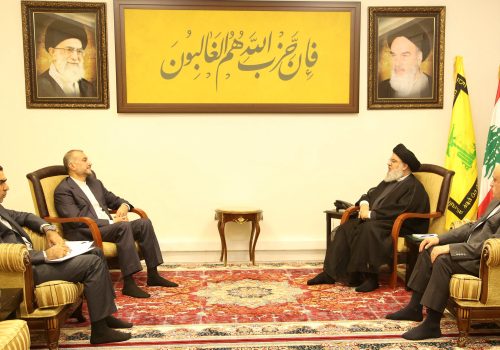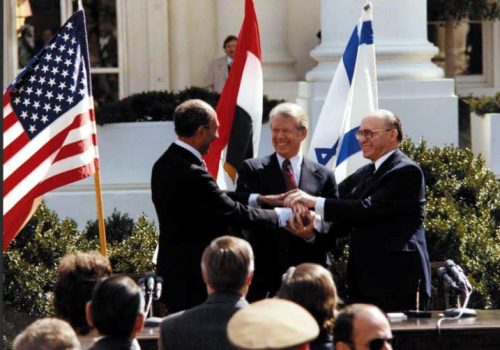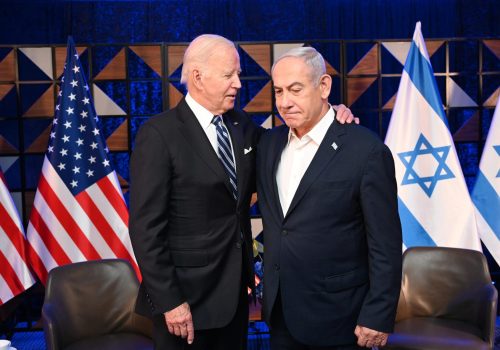The conflict in Gaza threatens Iraq’s stability, progress in US-Iraq relations
Militant group Hamas’s October 7 attack against Israel threatens to disrupt more than normalizing relations with Israel. Before the attack, the Middle East and North Africa were on a slow path to stabilization. Arab states and Israel were beginning to settle their differences, Saudi Arabia and Iran had established relations, and the Yemen conflict was slowly ending. In Iraq, economic prospects were slowly improving after its economy contracted due to the pandemic, exacerbated by ongoing anti-Iran protests and sectarian strife. Moreover, as the Stockholm International Peace Research Institute pointed out in March, Iraq was “enjoying its most stable period since 2003.” US-Iraq security relations even improved after the Iraqi Parliament called for the withdrawal of US troops in 2020. In August, both countries reaffirmed their commitment to increasing security cooperation.
That period of relative stability may be coming to an end. After Israel responded to Hamas’s deadly October 7 attacks, Iraqis took to the streets in massive pro-Palestinian protests, burning Israeli flags and chanting anti-American slogans. Iraqi Prime Minister Muhammed al-Sudani expressed solidarity with the Palestinian cause and has described the Israeli response as “brutal Zionist aggression.” His predecessors, including Mustafa al-Kadhimi, Haidar al-Abadi, Adil Abdul-Mahdi, and Nouri al-Maliki, echoed Sudani’s solidarity, adding that the Hamas attacks were a “natural response” to “Israeli provocations and violations.” Iraq’s Iran-backed militias, such as the Badr Organization, Asa’ib Ahl al Haq, and Kataib Hezbollah, expressed their support for the attacks and declared their readiness to attack American targets should the US intervene.
As Amir al-Kaabi and Michael Knights of the Washington Institute for Near East Policy point out, much of the Iraqi response is theater. Many militia threats were conditioned on unlikely events, such as direct US intervention or escalation. These threats also employ a little strategic ambiguity: what counts as direct or indirect intervention is up for interpretation. In fact, Kaabi and Knights describe the general response, even by Iraq’s most rabid militias, as “cautious” and, in some cases, “muted.” It should also be of little surprise that the Iraqi response is overwhelmingly pro-Hamas. As other Arab states were normalizing relations in 2022, Iraq enacted a law that made establishing relations with Israel punishable by death or life imprisonment. Anti-Israel sentiment runs deep, and the facts about the brutality of Hamas’s attack are not likely to resonate.
Still, the situation poses several difficulties for the United States. First, as Israel’s response continues and the conditions of the Palestinians in Gaza deteriorate, there will be increased pressure on the militias to act. For example, Abu Azrael, arguably Iraq’s most famous Iran-backed militant group, has reportedly gone to Lebanon and is awaiting any opportunity to enter Israel. Should such a “grassroots” intervention expand, the potential for escalation—and, thus, a greater US role—will increase. Second, strategic ambiguity can be a double-edged sword. Should Israel’s efforts to defeat Hamas succeed, militias may lower the standard for what counts as intervention, again setting conditions for escalation.
Perhaps more difficult for the United States is that it may not be in its interest, this time, to ignore this predictable, if muted, pro-Hamas response, given the brutality of the last Hamas attack. Indeed, it is in everyone’s interest to alleviate the suffering of the Palestinian people and it is reasonable to express concern—even outrage—over their worsening conditions. However, committing atrocity, even where there is a just cause, should not be tolerated.
As Daniel Henninger of the Wall Street Journal points out, direct attacks against civilians are becoming the “new normal.” While Hamas’s attacks were particularly shocking, Russia has also deliberately attacked civilians in its war against Ukraine, killing around ten thousand. To reverse this trend, there is little option other than finding ways to hold actors who engage in war crimes accountable. In the case of Russia, the United States has intervened on behalf of Ukraine and, along with its European allies, imposed sanctions on Russia. If the Iraqi militia reaction is to be taken seriously, a similar intervention in Gaza may lead to an escalation that undermines its larger relationship with Iraq.
For example, Kataib Hezbollah’s attacks against US forces in Iraq and Syria draw little support from the Iraqi people. However, US attempts to defend itself enable these militias to mobilize large protests when those defensive operations occur in Iraq. Still, Iraqi popular disinterest in what they view as an external conflict has provided something of an obstacle to escalation. However, given the largely anti-Israel-pro-Palestinian sentiment of the Iraqi people, militia attacks against US targets as part of a defense of the Palestinian people will likely draw support. Moreover, whatever little leverage the Iraqi government has to curb such attacks will have disappeared.
Making matters more complicated is the fact that escalation is not simply dependent on Israeli and US action. After the destruction of the Baptist Hospital in Gaza on October 17, Sudani immediately attributed it to Israeli action and called for a day of mourning. Shortly thereafter, unknown actors used drones to attack US troops. That the destruction of the hospital may be due to the actions of the Palestinian Islamic Jihad group will not likely impact Iraqi public opinion nor the Iraqi government’s position, which means the potential for escalation increases.
Thus, the way ahead for the United States is not clear. The simple message that innocent civilians should not be subject to murder, kidnap, and torture will get muted as Palestinian civilians flee their homes and their casualties climb, even if Israeli operations conform to the law of war. Still, the United States can chart a way forward by pressuring its regional partners, including Iraq, to condemn the brutality, if not the reason, for the Hamas attacks. Most may not, but even a superficial acknowledgment of the indefensible nature of responding to injustice with atrocity will reinforce norms against directly targeting civilians.
The United States should also act as a moderating influence on the conflict and find ways to avoid escalation while enabling Israel’s efforts to defend itself against Hamas and its allies. While doing so will be difficult, the United States can begin by mobilizing humanitarian relief for those affected by the conflict. It should also closely monitor the conflict for potential escalation on any side and condition assistance to any partner on cooperation to de-escalate the conflict. For the Iraqi government, its influence over the militias is limited, even if it did want to intervene. However, it can partner with the United States to ensure U.S. intentions are effectively communicated and misunderstandings kept to a minimum..
Taking these steps will not fundamentally change the dynamics of the conflict nor alleviate the pressure on Israel to destroy Hamas. But it may create opportunities to mitigate the damage the conflict may cause to Middle East stability and US influence.
Dr. C. Anthony Pfaff is a nonresident senior fellow with the Atlantic Council’s Iraq Initiative and the research professor for Strategy, the Military Profession, and Ethics at the Strategic Studies Institute (SSI), US Army War College in Carlisle, PA. The Opinions expressed here are his own and do not necessarily represent those of the US government.
Further reading
Thu, Oct 19, 2023
Israel misread Iran’s way of war. A proper understanding could help predict Hezbollah’s next moves.
IranSource By David Daoud
Iran—through Hezbollah—has spent almost two decades and considerable effort and funds building the Gaza Strip into the Axis of Resistance’s Southern Front against Israel.
Wed, Oct 18, 2023
Peacemaking can follow the Israel-Hamas war. History shows it.
MENASource By David Mack
The leaders of Israel, the Arab states, and the United States should take some critical lessons from past conflicts.
Wed, Oct 18, 2023
The Israel visit was just the start. Here’s what Biden needs to do next.
New Atlanticist By William F. Wechsler
The US and Israel should develop and publicly issue a joint set of common principles that will guide the future of Gaza, once Israel’s full military objectives against Hamas are reached.
Image: People hold a Palestinian flags as supporters of Iraqi Shi'ite armed groups gather during a protest against the U.S. for supporting Israel, and in support of Palestinians in Gaza, in Najaf, Iraq, October 20, 2023. REUTERS/Alaa al-Marjani


